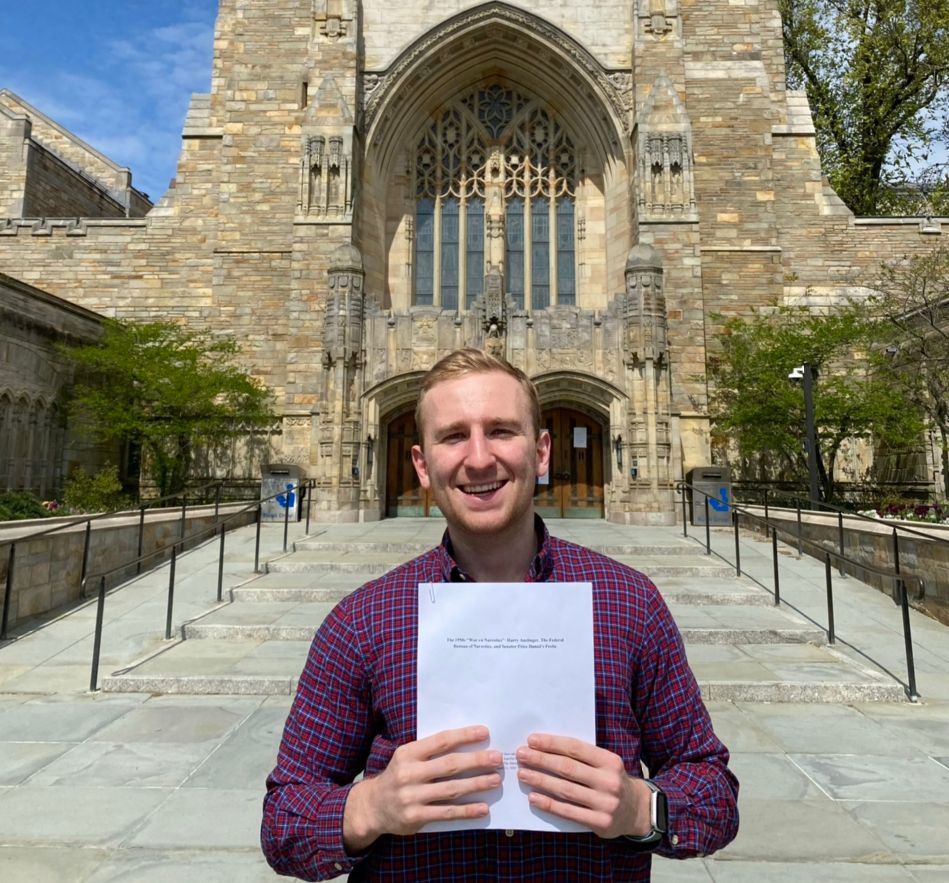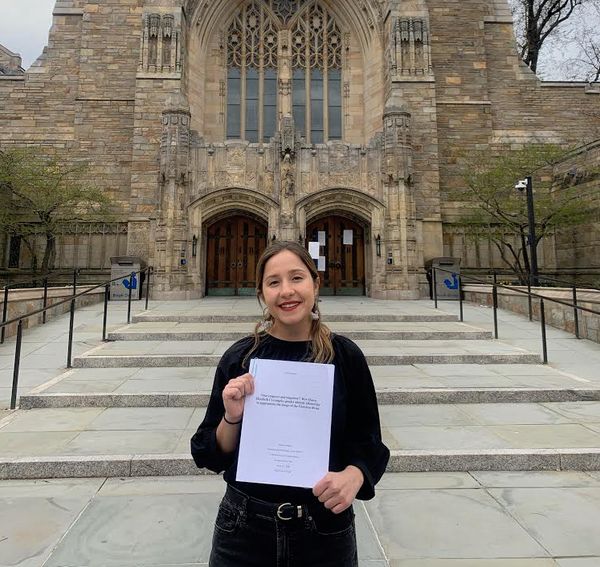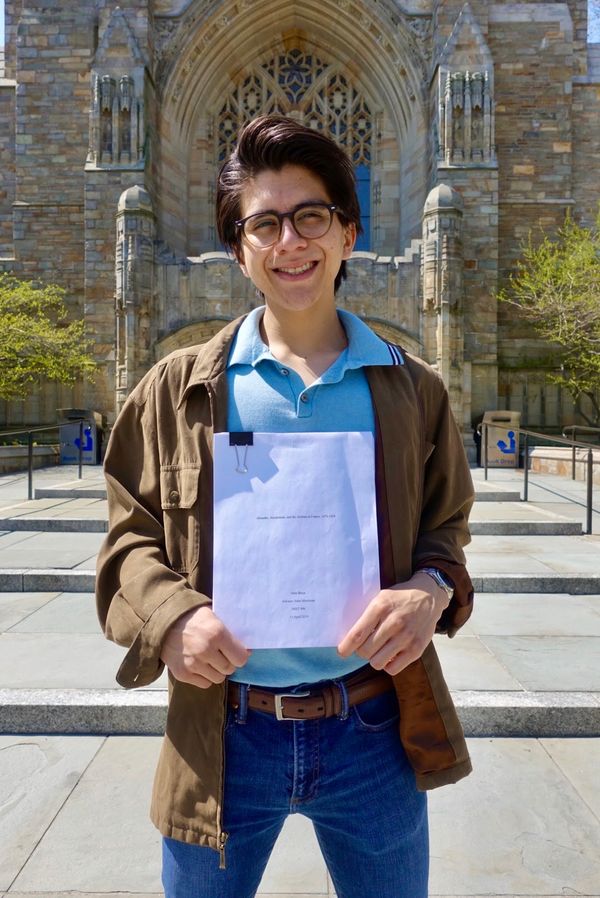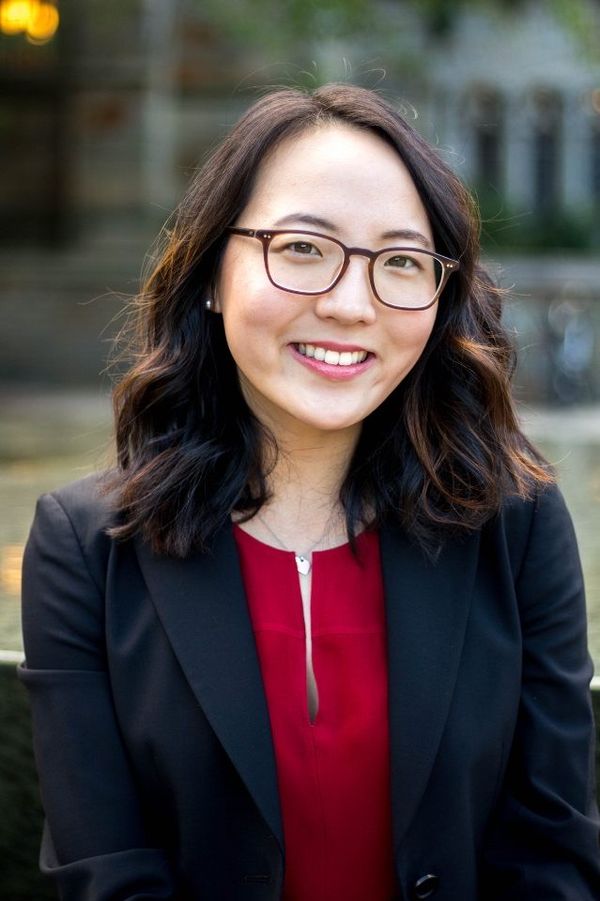Isabella Smeets discusses "The 1950s War on Narcotics: Henry Aslinger, the Federal Bureau of Narcotics, and Senator Daniel Price's Probe" with its author, William Horvath.
Isabella Smeets (IS): First off, I was wondering what inspired you to study the federal narcotics policy in the 1950s?
William Horvath (WH): It wasn’t until the summer before my senior year that I got a better idea of what I wanted to study for my senior thesis. That summer, I had the opportunity to intern at a think tank in DC. The highlight of that internship was a debate with the Heritage Foundation, which is a conservative think tank, and one of the big topics discussed in the debate was federal drug policy. I had always wondered why alcohol is treated so differently in our legal system than other narcotics, and researching for the debate further increased my interest in the question. Alcohol is more harmful than a lot of drugs that are prohibited by our legal system, so it was clearly not just utilitarian concerns that led to this disparity. I wanted to better understand how such a disparity within the legal system developed. It was evident that historical and cultural factors played a key role in the evolution of narcotics policy. These factors are crucial to understanding the federal government’s approach to drug policy today. One of the big developments that summer was that I learned about a man named Harry Anslinger, who was the first Commissioner of the Federal Bureau of Narcotics. He was perhaps the single most influential figure in U.S. history in terms of influencing federal narcotics policy. Yet he’s not somebody a lot of people have heard about, and I wanted to learn more about his career. I thought the senior essay would be the perfect way to do so. I was introduced to my fantastic advisor Professor Jennifer Klein through Professor Paul Freedman, who had originally given me advice on who would be suitable for a medieval legal history term paper, which is actually what I was thinking about writing about prior to my internship. During the first months of the semester, she worked with me to hone in on a suitable period to focus on. I had the opportunity to take a really interesting seminar in the first semester of my senior year taught by Dr. Brendan Shanahan. It was called Building the American State, and the class allowed me to explore different areas of narcotics policy in my term paper. I wrote about the 1914 Harrison Narcotics Act in the class, which was the first major piece of legislation at the federal level that regulated and taxed narcotics. That was an interesting project because it was a legislative history that really helped clarify how I wanted to approach my senior essay. In the piece, I focused on Dr. Hamilton Wright, who played a key role in the push for narcotics regulation in the early 20th century. Wright often deployed racialized rhetoric that particularly demonized Chinese Americans and southern Black Americans. I explored how he exploited cultural and racial fears to drive support for his cause. I observed quite a few parallels between Wright and Anslinger. As I was thinking about my senior essay, there were two periods of Anslinger’s career I was particularly interested in. I was interested in the 1930s, when some of the first legislation regarding marijuana was introduced at the federal level. The other area that piqued my interest, as there wasn't as much written about it, was the 1950s, which was when Congress passed two Draconian laws, the Boggs Act of 1951 and the 1956 Narcotic Control Act, often referred to as the Daniel Act. Dr. Shanahan’s Building the American State class helped me realize how fulfilling writing a legislative history could be, and talking through things with Professor Klein helped me hone in on the 1950s. We also identified an important archive, the Price Daniel papers in Liberty, Texas, that could be suitable for archival research on this topic. Price Daniel was a Texas Senator who, as the paper explores, played a key role in driving the 1956 legislation. That’s how I landed upon this topic.
IS: It sounds like the 1950s was a really untapped period for the history regarding the federal narcotics policy, so that’s great that you were able to contribute your research and scholarship about it!
WH: There is some really great existing scholarship as well. I don't want to sell that short, but it was useful to hone in on Senator Daniel’s contributions to the narcotics law, and, particularly, focus on his subcommittee that traveled the country. The existing scholarship was invaluable to developing my argument.
IS: Speaking about your research, I was wondering, in general, how you went about conducting research and writing? Did you have a specific process and how did you make use of Yale’s extensive research resources throughout your process?
WH: The biggest thing I want to say is that Yale has so many resources to facilitate the senior essay, and I found many of them useful. One was my advisor Professor Klein; she had so many great recommendations about the scholarly literature. She has an incredible knowledge of 20th-century American history, and that was really helpful as I worked to figure out the period I would focus on. Yale’s library and the librarians are outstanding. James Kessenides, the librarian for American History, was super helpful in helping me identify resources for my senior essay, and I'm very grateful for his assistance. Additionally, Berkeley’s Mellon Forum Undergraduate Research Grant allowed me to actually travel to Liberty, Texas. So those sorts of resources that allow people to do archival research are fantastic at Yale. That trip really helped me in the research process. In terms of the writing process, Professor Klein, my advisor, helped me a ton with that as well. Dr. Shanahan generously assisted me with the process too. As I mentioned before, I took his seminar in the first semester of my senior year, and that experience helped a lot in framing how to think about writing this paper. He also put me in contact with Dr. Anthony Gregory, a historian who had conducted extensive research on drug war historiography and narcotics policy. He was also really helpful in pushing me towards research material. One final writing resource that was extremely valuable and that I can't recommend enough was the residential college writing tutor program. I think they are underappreciated by Yale students. They're willing to go line by line with your writing, and I find that sort of feedback is super helpful in making you a better writer. Cathy Shufro, Berkeley’s writing tutor, was very helpful in the process, and I’m thankful for her help in tightening my prose.
IS: Shifting to your argument itself, in your introduction you proclaim that, “the period provides yet more evidence that federal narcotics policy has been totally divorced from scientific evidence throughout its entirety. The Global Commission on Drug Policy found that, rather than scientific or health data, “historical and cultural precedents” have largely driven narcotics policy. Congress’ unshakeable commitment to Anslinger’s punitive approach during this period emblematizes this reality.” That was a very interesting and concisely worded thesis, and I was wondering if you began your research with this idea or if this idea arose from your research?
WH: So it's definitely a little bit of both. In the summer before, I had been introduced to these arguments, but then actually combing through the archival research, it was almost jarring seeing some examples of just how true this was. The arguments made by the New York Academy of Medicine, which are covered in the paper, are illustrative. These non-punitive approaches were largely dismissed by individuals like Anslinger and Daniel. In the mid-1950s, you really see this conflict between a more medical-oriented approach and some of the cultural elements that it runs up against, which officials like Anslinger skillfully exploited. A lot of ingrained biases prevented what one could anachronistically label a more harm-reduction-based approach from being implemented. Instead, the federal government favored Anslinger’s punitive approach. As I continued with the research process, I realized just how unfounded many of the claims made by Anslinger and his allies were. The archival research I conducted was pivotal to my understanding, and I think it's very important to ground your historical research in what you find in archival research, rather than just coming in with an agenda. You have to be fair in your approach to individuals like Anslinger, who are firmly products of their time. While it's very tempting when you read some of the horrendous things he said to go in swinging, you have to understand and unpack the social context he was operating in as well. I tried throughout to let the evidence guide me as I analyzed the particular roles individuals like Anslinger and Daniel played in shaping policy.
IS: You've already mentioned her, but I was wondering more about your thesis advisor Jennifer Klein and her role in the shaping of your thesis.
WH: Professor Klein was fantastic and excited to help with the project. I couldn't have asked for more throughout the process, and it was kind of her to take me on because I hadn't actually taken a class with her. So it was really nice of her to take a chance on me. Advising an undergraduate on a senior essay is a big commitment for a professor, time-wise, with little reward compared to the other scholarship and work they’re up to. I am so appreciative of all the time she gave me. She was very helpful right from the beginning. She offered me some suggestions for secondary literature to read that was a big part of my first semester. I dedicated the first few months of the fall to just getting my head around the vast secondary literature on the issue and trying to hone in on which period I wanted to make my contribution to. She helped me brainstorm what would be the appropriate topic at a high level, and then later on in the writing process, she was incredibly helpful in providing thorough feedback. She also had some great advice about making sure I had the initial draft of the essay finished before spring break, which proved to be particularly apt advice with the disruption caused by Covid starting in March. I think it would have been pretty tough to write a senior essay in March and April with all that was going on.
IS: A more overall question: what was your favorite part of being a history major at Yale? Did you go into Yale knowing that you wanted to be a history major?
WH: Actually, my answer to both questions is related. My favorite part of being a history major at Yale was undoubtedly taking seminars offered by the department, and it was taking these seminars that convinced me to be a history major. I wasn't sure going in exactly what I wanted to major in. I ended up majoring in history and economics. For economics, it was the intro sequence that took me in as I really enjoyed the economic way of thinking that I hadn’t been exposed to in high school. History was a little bit more of a roundabout path. I had always loved history before coming to Yale, and I ended up taking a freshman seminar taught by Professor Valerie Hansen called The History of World History that I can’t recommend enough. We got to read many interesting ancient histories and had fascinating discussions throughout the semester. She also became my advisor for my sophomore year, and she was incredibly helpful. I still wasn't sure if I wanted to major in history. What started sealing the deal is my conversations with her during which I realized how much I missed the study of history. She encouraged me to major in history because she thought I'd get a lot out of the senior essay and departmental seminars. I ended up taking some seminars that Professor Hansen recommended and found them very rewarding. I can't recommend the seminars enough; I think it's just a great opportunity to develop a close relationship with a professor who is an absolute expert in one area of the field. I took an eclectic mix of seminars and enjoyed all of them. There are different approaches to the history major; you can do it thematically or take an eclectic mix of classes, and I think there’s value in both. Seminars, in addition to teaching you about a specific period of history, really help develop your speaking, writing, and research skills. So seminars were definitely my favorite part of the history major experience.
IS: Speaking of history seminars, did you have a favorite during your time at Yale?
WH: I am going to punt on naming a favorite. There's a handful of seminars that I really, really enjoyed, The History of World History being one of them. As I mentioned before, the Building the American State seminar helped me hone in on my senior essay topic. I took two seminars taught by Dr. Mordechai Levy-Eichel: one on liberalism and one on the New York intellectuals. The discussions in those classes were some of my favorites at Yale. I also took a seminar called the Middle East and the West: A Cultural Encounter, with Professor Abbas Amanat, where there were only three other students in the class. That opportunity to be in a dialogue with him in such a small class was a fantastic and memorable Yale experience. There are so many great seminars, and honestly it’s making me sad thinking about these because I want to go back a little bit.
IS: Looking to the future, does your thesis lead into your postgraduate work? And if so, how?
WH: I'm planning on attending law school, and I’m applying to start in fall 2022. Narcotics policy is one area that I'm interested in exploring further in law school because I find it fascinating and believe getting it right is crucial. And my senior essay is certainly relevant to contemporary legal issues. Mandatory minimum sentencing for federal narcotics offenses, which is crucial to understanding criminal justice today, originated in the 1950s. And no matter the area of law that I eventually practice, I definitely want to keep and apply the historical perspective that I've gained from my senior essay. Such a perspective is vital to understanding how specific elements of our legal system developed. This development can sometimes be messy, and I think that the history of narcotics legislation in the United States is a perfect and tragic example of that.
IS: You've already imparted so much of this, but the final question I was going to ask was if there was any advice you'd give to younger prospective history majors?
WH: One piece of advice would be to develop relationships with professors in the department early on because they can assist you with determining which classes to take. They have inside information about the different classes, and they know what you might enjoy based on their understanding of your interests. There’s no better person to get an idea from about professors and their courses than another professor. The other big piece of advice I'd have is to just take as many seminars as possible. I actually didn't take any my sophomore year, and that's a regret of mine. I had to catch up a lot on that in my junior and senior year, and I wish I had taken more seminars early on at Yale because they really are a highlight of the history major. I guess one other piece of advice is don't necessarily freak out about your senior year essay topic early on because you'll have time to hone and develop it. As long as you can make deadlines once you get to Yale in the fall of your senior year you’ll be okay. Make sure to explore some different areas and find a topic you're truly excited about. It's better to write about something you're excited about that you decided to focus on in August than to do a topic you settled on in your junior year that you’re less excited about. The most important thing is to be excited about a topic as you'll have plenty of time to research and write.





